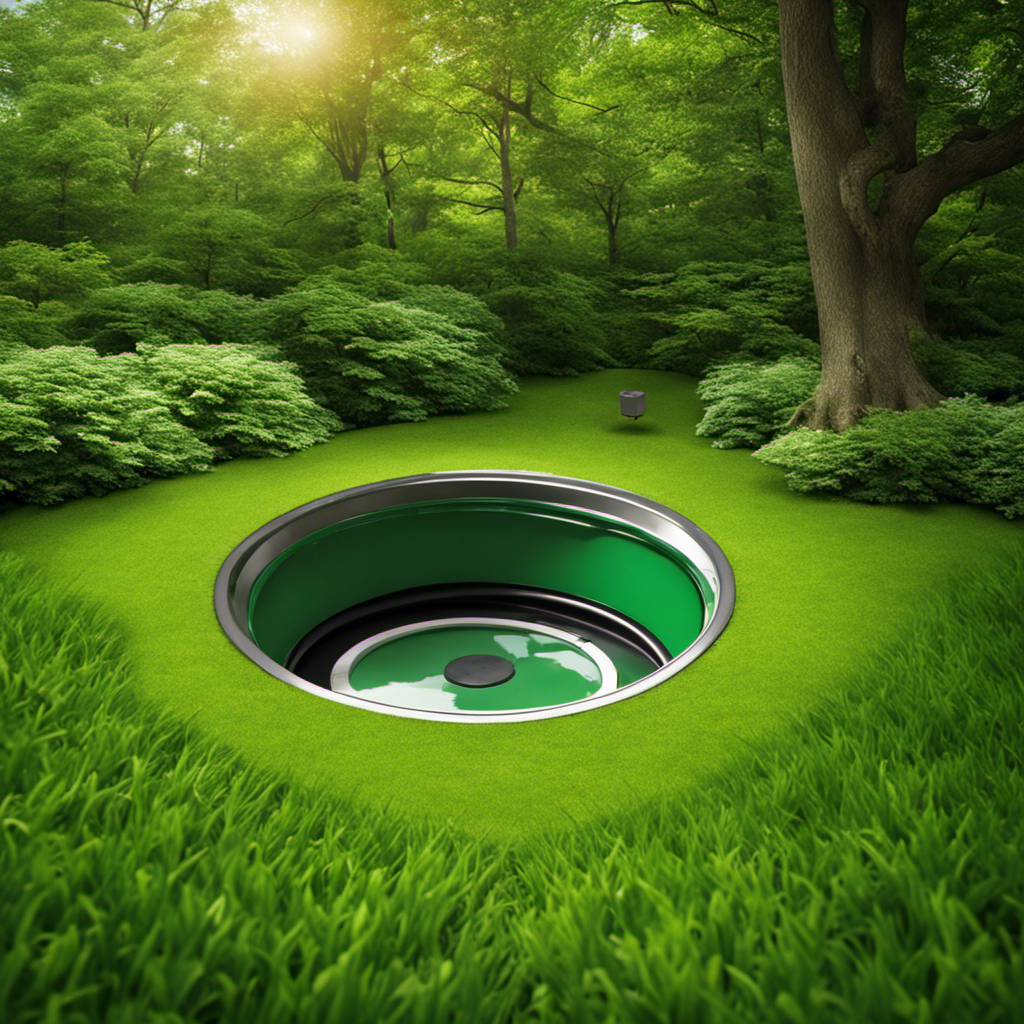I’ve always wondered, what toilet cleaner is safe for septic systems?
As someone who cares about the environment and the health of my septic system, I wanted to find a solution that wouldn’t harm the delicate balance of bacteria in my tank.
Through my research, I discovered that there are harmful chemicals to avoid and natural, eco-friendly options to consider.
In this article, I will share my findings and provide DIY toilet cleaner recipes and tips for proper maintenance.
Let’s dive in and keep our septic systems happy and healthy!
Key Takeaways
- Bleach, ammonia, and antibacterial products should be avoided as they can harm the bacteria in the septic tank and decrease waste breakdown efficiency.
- Eco-friendly and biodegradable options labeled as safe for septic systems should be chosen to reduce the risk of septic tank damage.
- Natural ingredients like vinegar, baking soda, and lemon juice can be used as effective and gentle alternatives for toilet cleaning.
- Regular maintenance, including checking for leaks or cracks, using septic-safe toilet cleaners, and considering septic tank additives with beneficial bacteria, is essential for proper septic system function.
Understanding Septic Systems
Understanding how septic systems work can help you choose a toilet cleaner that is safe for them.
Septic systems are wastewater treatment systems commonly used in rural areas where access to a centralized sewer system is limited.
The installation of a septic tank is a crucial step in setting up the system. The tank acts as a primary treatment unit, separating solid waste from the liquid effluent.
Over time, the solid waste accumulates at the bottom of the tank, while the liquid effluent flows out into the drain field for further treatment.
Regular septic system pumping is necessary to remove the accumulated solids and maintain the system’s proper functioning.
Harmful Chemicals to Avoid
You should avoid using certain chemicals that can be harmful to your septic system. Toxic ingredients found in some household cleaners can cause significant septic tank damage over time. These chemicals include bleach, ammonia, and antibacterial products containing triclosan.
Bleach, commonly used as a cleaning agent, can kill the beneficial bacteria in the septic tank that help break down waste. Ammonia, often found in glass cleaners, can disrupt the natural balance of bacteria in the tank. Antibacterial products containing triclosan can also harm the bacteria, leading to decreased efficiency in waste breakdown.
It is essential to choose septic-safe alternatives that do not contain these harmful chemicals. Look for eco-friendly and biodegradable options that are specifically labeled as safe for septic systems. Taking this precaution will help maintain the health and functionality of your septic system.
Natural and Eco-Friendly Options
Using natural and eco-friendly alternatives is a great way to maintain the health and functionality of your septic system. Not only do these options help protect the environment, but they also offer several benefits for your septic system. Natural ingredients such as vinegar, baking soda, and lemon juice can effectively clean and deodorize your toilet without the need for harsh chemicals. These ingredients are gentle yet powerful, breaking down waste and preventing clogs. Additionally, they are biodegradable and non-toxic, ensuring that they won’t harm your septic system or the surrounding ecosystem. By choosing eco-friendly alternatives, you can reduce the risk of damage to your septic system while also promoting a cleaner and safer environment.
| Natural Ingredient | Benefits |
|---|---|
| Vinegar | – Eliminates odors – Dissolves mineral deposits – Inhibits bacteria growth |
| Baking Soda | – Scrubs away stains – Absorbs odors – Helps break down waste |
| Lemon Juice | – Freshens and deodorizes – Disinfects – Removes stains |
DIY Toilet Cleaner Recipes
There are numerous DIY recipes for keeping your toilet clean and fresh without the need for harsh chemicals. These toilet cleaning hacks not only help maintain a sparkling clean toilet but also offer several benefits of homemade cleaners.
Here are three effective DIY toilet cleaner recipes you can try:
-
Vinegar and Baking Soda Solution: Mix equal parts of vinegar and baking soda to create a powerful cleaning solution. The acidic nature of vinegar helps break down stains and eliminate odors, while the baking soda acts as a gentle abrasive.
-
Lemon Juice and Borax Paste: Combine fresh lemon juice with borax to create a paste. Lemon juice contains citric acid that helps dissolve grime and stains, while borax acts as a disinfectant and deodorizer.
-
Essential Oil Spray: Mix water with a few drops of your favorite essential oil, such as tea tree or lavender. This homemade spray not only adds a pleasant fragrance to your toilet but also has antimicrobial properties.
Tips for Proper Maintenance
For proper maintenance of your toilet, it’s important to regularly check for any leaks or cracks in the tank or bowl. This will help prevent any potential issues and keep your toilet functioning properly.
When it comes to choosing toilet cleaner brands, it’s crucial to select ones that are safe for septic systems. Look for products that are labeled as septic-safe or specifically designed for use in septic systems. These cleaners are formulated to be gentle on the bacteria in your septic tank, ensuring the system continues to operate efficiently.
Additionally, consider using septic tank additives to further enhance the performance of your septic system. These additives contain beneficial bacteria that help break down waste and reduce the risk of clogs and backups.
Frequently Asked Questions
Can I Use Bleach to Clean My Toilet if I Have a Septic System?
I wouldn’t recommend using bleach to clean my toilet if I have a septic system. It’s better to explore bleach alternatives or natural toilet cleaners that are safe for septic systems.
Are There Any Specific Toilet Cleaners That Are Recommended for Septic Systems?
I recommend using toilet cleaners that do not contain harmful ingredients such as bleach, ammonia, or phosphates. Instead, opt for natural alternatives like vinegar, baking soda, or enzyme-based cleaners, which are safe for septic systems.
How Often Should I Clean My Toilet to Maintain a Healthy Septic System?
I clean my toilet regularly to maintain a healthy septic system. It’s important to use eco-friendly toilet cleaners that won’t damage the system. Following proper cleaning methods ensures the longevity of my septic system.
Can Using Certain Toilet Cleaners Damage My Septic Tank Over Time?
Using certain toilet cleaners can damage septic tanks over time. Avoid cleaners with harsh chemicals like bleach or ammonia. Natural toilet cleaners, on the other hand, offer the benefits of being safe for septic systems and the environment.
Are There Any Signs or Indicators That My Septic System Is Being Negatively Affected by the Toilet Cleaner I’m Using?
Using the wrong toilet cleaner can have negative effects on my septic system. Signs like slow drains and foul odors may indicate incompatibility. It’s important to choose a cleaner specifically labeled safe for septic systems.
Conclusion
In conclusion, it’s crucial to choose toilet cleaners that are safe for septic systems to maintain their optimal function.
According to a study conducted by the Environmental Protection Agency, using septic-safe toilet cleaners can reduce the risk of septic system failure by up to 50%.
By avoiding harmful chemicals and opting for natural and eco-friendly options or DIY recipes, we can protect the delicate balance within our septic systems.
Proper maintenance, along with the right choice of toilet cleaner, ensures the longevity and efficiency of our septic systems for years to come.










